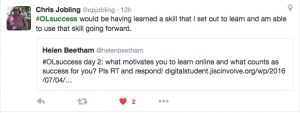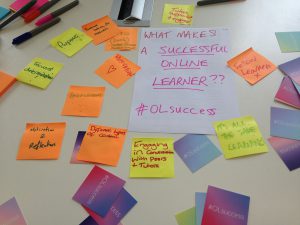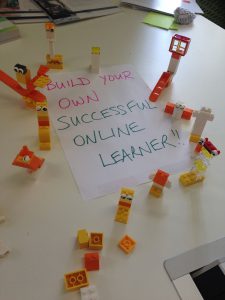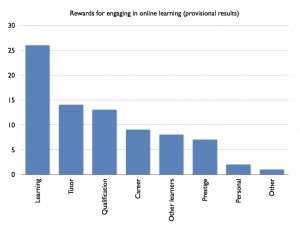Twitter traffic has continued to build today, and there has been a lot of activity around the #uogapt conference as well as our dedicated hashtag #OLsuccess. You can get the full picture from storify, as usual.
Much of today’s discussion picked up themes and thoughts from yesterday (lesson one: online conversations can’t be coralled into convenient 24-hour blocks). So we continued to hear plenty about what learners like and value in the online experience. New points included: working with others, especially further afield; feeling part of an learning community; and seeing new learning put into practice.
 A participant on the long-running online course/community DS106 summarised what he liked about that experience:
A participant on the long-running online course/community DS106 summarised what he liked about that experience:
- it was of the web, not just on the web
- huge efforts were made to build and cohere a strong community – in terms of promoting comment, interaction and reaction.
- it was fun! … the spirit of anarchy and playful intertextuality was compelling and refreshing.
- it was non-prescriptive and unbounded. There was no concept of “drop-out” (indeed, it was more of a “drop-in” course…) and it was possible to take what you needed from it.
As the day went on we delved more deeply into why learners go online to learn and what rewards they expect. This chart shows how participants in our ten-minute survey responded to the question ‘what makes you feel successful when you learn online?’ (Note that this is a snapshot and will change as more people complete the survey – when we will also publish a more detailed analysis.) Participants could choose up to three.
‘Enjoying the learning itself’ was chosen by 26 learners, almost twice as many as chose ‘Gaining a credit or qualification’ or ‘Positive feedback from a tutor’. And 7 respondents chose only ‘learning itself’ as their measure of success – far higher than chose any other option on its own. However, we have no learners under 24 completing the survey yet. We’d really like to correct this bias, as we think that qualifications and career goals may be more important to younger online learners. So if you work with younger online learners – or are one – please encourage them to get involved.
Comments on the forums and on twitter added some fascinating detail to this picture. So several participants felt successful once they were actually using what they had learned – incorporating online CPD into their ongoing work, developing their career in new directions, cascading learning to other people. ‘success = learning & then using‘ tweeted @ClareThomsonQUB.
 ‘With CPD there is the added element of being able to relate learning to practice and, via the reflective learning cycle, to be able to show how this has improved personal performance / knowledge.’
‘With CPD there is the added element of being able to relate learning to practice and, via the reflective learning cycle, to be able to show how this has improved personal performance / knowledge.’
 Others acknowledged that people still opt to learn online because they are interested in the experience itself. So for example ‘[teaching] staff learning online get unique insight into student experience to loop back into teaching practice’ (@suewatling).
Others acknowledged that people still opt to learn online because they are interested in the experience itself. So for example ‘[teaching] staff learning online get unique insight into student experience to loop back into teaching practice’ (@suewatling).
Another theme of the day was that online learning is a different experience for different students. Not only do we bring different motivations and enjoy different rewards, we also experience the online environment differently according to our preferences and needs. Several forum participants disclosed that they are on the autistic spectrum and that working online suits them in particular ways:
‘I prefer to work alone online and offline, but it is easier to have conversations online than face to face because I don’t have to make eye contact and I can take as much time as I need to answer people.’
‘Being in an environment with noise and distractions makes learning difficult whereas learning at home I can create the best atmosphere for me.’
This reminds me of a complexity we identified in our literature review. While some online learners really value social contact and opportunities to collaborate, others prefer the freedom of studying independently, and may find socialising a distraction or source of stress. There really is no one way of organising online learning that will suit everyone, but perhaps we can be more aware – and help learners themselves to be more aware – of the diversity of learning needs.
Another participant is dyslexic and in his case online learning presents additional barriers rather than opportunities:
‘A site that isn’t dyslexic friendly makes it almost impossible for me to continue with that course. Too much information just on the first page can be challenging and this is an area that I sense hasn’t actually been investigated enough. ‘
Sarah Knight and I took time out fro #OLsuccess to present other findings of the #digitalstudent programme at the University of Greenwich Academic Practice with Technology conference. Our workshop focused on the digital student benchmarking tool and the Tracker. Perhaps our work on online students could produce new versions of these tools – what do you think? What outcomes might help to make the experience of learning online better?
 We did manage to collect some ideas for #OLsuccess week while we were there – see also our lego creations below.
We did manage to collect some ideas for #OLsuccess week while we were there – see also our lego creations below.
No doubt these discussions will continue tomorrow, but that will be another day.
#OLsuccess creative
Alongside posts and polls we wanted to try making this week creative and enjoyable too. We’ve already had a go at building some successful online learners out of lego…
 The DS106 community will be offering some creative activities around the theme of online learning as the week goes on. For now I have put together a very short brief for online learners – and their teachers – interested in digital storytelling. The brief is very simple: tell us something about your experience of online learning. The size, depth, medium, platform and tools you use are entirely up to you. There are a few examples emerging on our discussion forum, where some learners are contributing longer postings with lots of personal detail. You can read the brief and find out more here.
The DS106 community will be offering some creative activities around the theme of online learning as the week goes on. For now I have put together a very short brief for online learners – and their teachers – interested in digital storytelling. The brief is very simple: tell us something about your experience of online learning. The size, depth, medium, platform and tools you use are entirely up to you. There are a few examples emerging on our discussion forum, where some learners are contributing longer postings with lots of personal detail. You can read the brief and find out more here.


